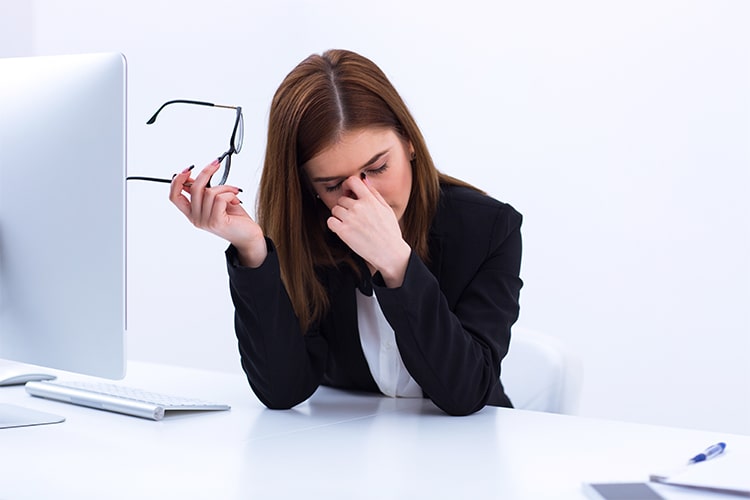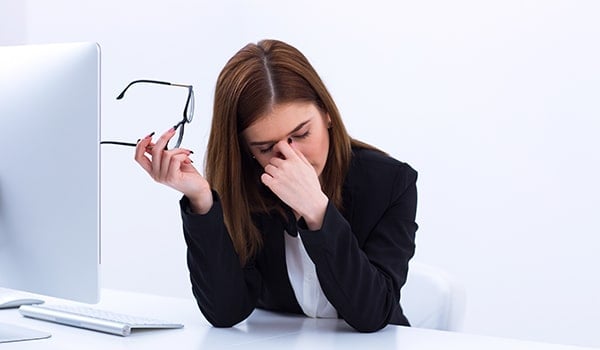We all get stressed from time to time. Psychologists define two types of stress: short- term and long-term. Short-term stress activates the ‘fight-or-flight’ mechanism and is essential for survival. Also, it can work as a motivator and be like an energy source. However, constant stress can exacerbate and cause many health problems, including high blood pressure, eating disorders, sexual dysfunction, hair loss, gastrointestinal, and mental health problems. According to the latest research, stress triggers a chemical response that makes your skin more reactive and sensitive. This, in turn, leads to various skin problems, including acne, eczema, rosacea, and psoriasis.

If your skin is getting worse during hard times in your life, that’s what you need to know:
Eczema:
When you are stressed, your body increases the production of cortisol and adrenaline, the stress hormones. The high level of cortisol suppresses the immune system, which leads to an inflammatory response in your skin. Immune system imbalance causes allergic reactions that drive up eczema symptoms.
Stress can cause eczema on hands, feet, face, or neck. If you have eczema flare while you are going through difficult times, you might want to change your priorities in life and start taking care of your mental health.
To treat eczema, you should avoid scratching since it can only harm your skin and make the disease worse. If you are aware of the possible danger but still can’t resist scratching, you can apply a cold compress, eczema cream or place a single layer of wet gauze.
Make an appointment with your doctor to check your skin condition and get a prescription for an antibiotic cream in case you have a bacterial infection. Your doctor might also recommend you to take oral antibiotics for a short time.
Acne:
Have you ever noticed that every time you had an important day, like a wedding or a job interview, you experienced another acne breakout? The latest research proved that stress exacerbates acne. Stress hormones such as cortisol and adrenaline drive up the skin’s oil production that leads to pimples. Stress acne is common among people aged 35 and older.
There are certain signs that can tell you whether your acne was affected by stress or not. It is usually accompanied by itching, redness and a high number of whiteheads and blackheads. If the acne breakout doesn’t tend to match up with your stressed time, most probably it is related to environmental factors and your diet. You need to keep track of it and then contact a dermatologist to get professional attention. However, lowering your cortisol level is also essential. Start with improving your diet by reducing sugar intake. If you have sugar cravings, eat dark chocolate, pears, bananas, and yogurt (these can stable cortisol levels).
Psoriasis:
According to the American Academy of Dermatology, psychological stress can also trigger a psoriasis flare-up. If you have this chronic skin condition and apply treatments such as steroid creams, light therapy, and oral medications, but you still experience psoriasis, it’s time to bring the attention to your mental health. Stress management should be part of your treatment plan, as well. Stress attacks the immune system, and it causes your skin cells to grow rapidly and abnormally.
How To Help Your Stressed Skin:
Getting medical treatment is crucial; however, no cream will help you if you don’t create your personal stress-management plan. There are a lot of situations in your life that you can’t control. However, you are the one who decides how to feel about them. You can manage your stress levels and prevent skin conditions flare-ups. There are plenty of proven methods:
To ease the effect of stress on your skin, you should get regular exercise. Your blood vessels can expand to pump more blood around the body, which improves the circulation of oxygen and helps treat skin diseases. If you have acne, eczema or psoriasis, prevent overheating and sweating. To do so, you should take a cold shower right after the work-out.
Spend time with people you love. Being isolated during a difficult period of your life can affect your mental health. If you don’t have the loved ones next to you at the moment, you can still get social. For instance, you can go to the concert, have a language exchange meeting or go to the date.
Make a stress-journal to express your negative thoughts and identify the main source of stress. If you are overwhelmed and feel like you can’t deal with stress on your own, consider a therapy session.
Another important thing is to maintain a healthy diet that would include fruit, vegetables, naturally fatty fish, peanuts, and herbal supplements. Try to avoid high-fat foods, sugar, caffeine, and simple carbohydrates.
As you can understand, your mind and skin are connected on different levels. According to the latest studies, acne, eczema, psoriasis, and other skin problems are caused by stress in 30% of cases. That’s why you need to take measures to bring it under control.
